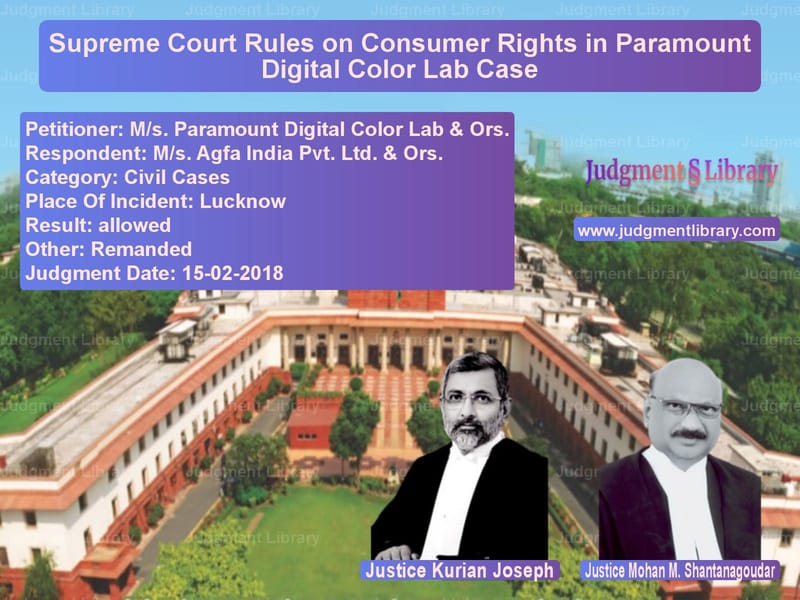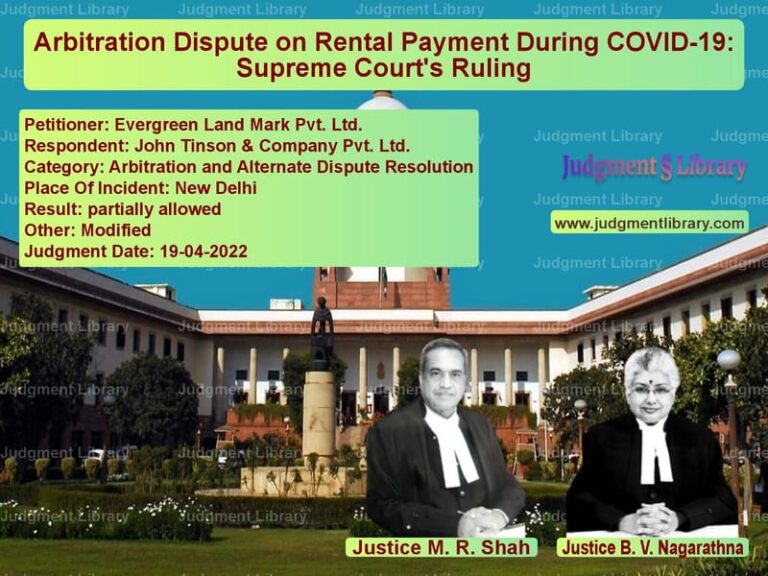Supreme Court Rules on Consumer Rights in Paramount Digital Color Lab Case
The Supreme Court of India, in its judgment in M/s. Paramount Digital Color Lab & Ors. vs. M/s. Agfa India Pvt. Ltd. & Ors., delivered a significant ruling on consumer rights and unfair trade practices. The case revolved around whether the appellants, who had purchased a high-end digital color lab machine, could be considered ‘consumers’ under the Consumer Protection Act, 1986, and whether the respondents were liable for defective goods and misrepresentation.
Background of the Case
The appellants, unemployed graduates, started a photography business for self-employment. In 2004, they purchased an Agfa Minilab D-Lab.1 Allrounder machine for Rs. 62,00,000, based on assurances from the respondents, Agfa India Pvt. Ltd. However, after purchasing the machine, the appellants faced severe technical and software-related defects that rendered the machine unfit for their business.
Despite multiple service requests, the issues persisted. The appellants later learned that the software in the machine was still under research and development at the time of purchase. The respondents failed to provide the promised solutions, leading to financial losses for the appellants.
Legal Issues
- Whether the appellants were ‘consumers’ under Section 2(1)(d) of the Consumer Protection Act.
- Whether the respondents engaged in unfair trade practices by selling a defective machine.
- Whether the appellants were entitled to compensation for financial losses and mental agony.
Petitioner’s (Paramount Digital Color Lab) Arguments
- The machine did not function as promised, causing financial losses.
- The respondents misrepresented the quality and capabilities of the machine.
- The appellants were unemployed graduates who started the business for self-employment, qualifying them as consumers.
- The warranty expired before the issues were resolved, leaving them with a non-functional machine.
Respondent’s (Agfa India Pvt. Ltd.) Arguments
- The appellants used the machine for commercial purposes and were not consumers under the Act.
- The technical defects were within acceptable industry standards.
- The appellants were provided service support, but their business model failed for other reasons.
Supreme Court’s Observations
The Supreme Court, comprising Justice Kurian Joseph and Justice Mohan M. Shantanagoudar, made the following key observations:
1. Definition of Consumer
The Court ruled that individuals who purchase goods for self-employment and livelihood can be considered consumers. The judgment stated:
“If a person buys and uses the machine exclusively for earning his livelihood by means of self-employment, he qualifies as a consumer.”
2. Misrepresentation and Unfair Trade Practices
The Court found that Agfa India Pvt. Ltd. had sold the machine despite knowing its software was under development. It ruled:
“Selling a product with undisclosed defects amounts to an unfair trade practice and a violation of consumer rights.”
3. Liability of Respondents
The Court held that the respondents, including the former Managing Director and General Manager, were collectively responsible for the financial losses suffered by the appellants. It observed:
“Companies must be held accountable for selling defective products and failing to rectify issues within the warranty period.”
Final Judgment
The Supreme Court ruled in favor of the appellants and held:
- The appellants were consumers under the Consumer Protection Act.
- The respondents were liable for unfair trade practices and misrepresentation.
- The appellants were entitled to compensation for financial losses.
- The judgment of the National Commission was set aside, and the State Commission’s decision favoring the appellants was restored.
Impact of the Judgment
The Supreme Court’s ruling in this case reinforced key consumer protection principles:
- Individuals using goods for self-employment qualify as consumers.
- Manufacturers must disclose known defects before selling a product.
- Misrepresentation in product sales constitutes an unfair trade practice.
- Consumers can seek compensation for losses due to defective goods.
Conclusion
The Supreme Court’s ruling in Paramount Digital Color Lab vs. Agfa India Pvt. Ltd. is a landmark decision in consumer law. It upholds the rights of small entrepreneurs and ensures that companies cannot mislead consumers into buying defective products. This judgment sets a precedent for holding businesses accountable for unfair trade practices and protecting consumer interests.
Petitioner Name: M/s. Paramount Digital Color Lab & Ors.Respondent Name: M/s. Agfa India Pvt. Ltd. & Ors.Judgment By: Justice Kurian Joseph, Justice Mohan M. ShantanagoudarJudgment Date: 15-02-2018
Don’t miss out on the full details! Download the complete judgment in PDF format below and gain valuable insights instantly!
Download Judgment: Ms. Paramount Digit vs Ms. Agfa India Pvt. Supreme Court of India Judgment Dated 15-02-2018.pdf
Direct Downlaod Judgment: Direct downlaod this Judgment
See all petitions in Consumer Rights
See all petitions in Contract Disputes
See all petitions in Damages and Compensation
See all petitions in Judgment by Kurian Joseph
See all petitions in Judgment by Mohan M. Shantanagoudar
See all petitions in allowed
See all petitions in Remanded
See all petitions in supreme court of India judgments February 2018
See all petitions in 2018 judgments
See all posts in Civil Cases Category
See all allowed petitions in Civil Cases Category
See all Dismissed petitions in Civil Cases Category
See all partially allowed petitions in Civil Cases Category







